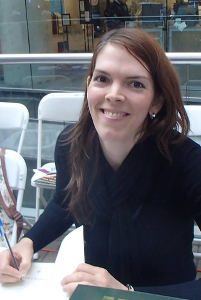 Featured Interview With Sarah Lane
Featured Interview With Sarah Lane
Tell us a little about yourself. Where were you raised? Where do you live now?
I’m a Canadian author, born in California, raised in British Columbia. I’ve done some traveling in Central America, Western Europe, and Central Africa. I wrote my first novel The God of My Art while living in Annecy, France, and edited it while living in Seattle, USA. Now a mom to two, I’ve put down tentative roots in Vancouver, Canada, for the time being.
At what age did you realize your fascination with books? When did you start writing?
Television wasn’t allowed in my house as a child, so I developed an early love of reading. After one of my poems was published in my high school newsletter, I knew I wanted to write more.
Who are your favorite authors to read? What is your favorite genre to read. Who Inspires you in your writings?
So many different authors, as my tastes are eclectic. I loved Chimamanda Ngozi Adichie’s masterpiece Half of a Yellow Sun. I get goose bumps just thinking about that book. It’s that good.
Tell us a little about your latest book?
The God of My Art is a psychological novel about a young woman from a small northern town in British Columbia who can’t decide what she wants most: to escape poverty or be an artist. She ran away as a teenager to Vancouver, and she has since managed to finish high school and get into university. That is when the trouble begins for her, however: she feels like a fake and an outsider amongst the more privileged middle-class kids. And then she meets Matthew…
The God of My Art is contemporary women’s literary fiction. It is a coming-of-age story of a young woman and artist, so it is both a female bildungsroman and a kunstlerroman. As the story of a young woman coming into her own, it emphasizes dialogue and internal thought over action, and focuses on Helene’s psychological growth and changes to her character. As an artist’s novel, it shows Helene’s sensitive and unconventional nature as she struggles to fling off the welfare class values of her impoverished background, where art has no place, while refusing to conform to the new middle class values that surround her at university, where art is held in higher esteem.
It is not a religious book but rather a philosophical novel. Another word for the artist’s muse is the goddess of art: the eternal feminine who inspires the enamored male artist to great works of art. Helene’s muse is a man, so the title makes reference to the male source of her inspiration.
The novel is not autobiographical. I get this question a lot. I think it is because of the first-person point of view. The “I” telling the story is a fictional character. Her name is Helene, and she’s a somewhat naive, unreliable narrator.
In terms of what inspired me to write The God of My Art, the short answer is that I wanted to figure out what this weird impulse is to be an artist. The long answer is that I wanted to figure out where the balance lies between freedom and responsibility and between necessity, fate, and a lack of choice. I was particularly interested in how class, gender, terrible childhoods, other people’s decisions, and random accidents could influence my characters’ choices and limit their freedom to decide their lives.
Connect with the Author on their Websites and Social media profiles